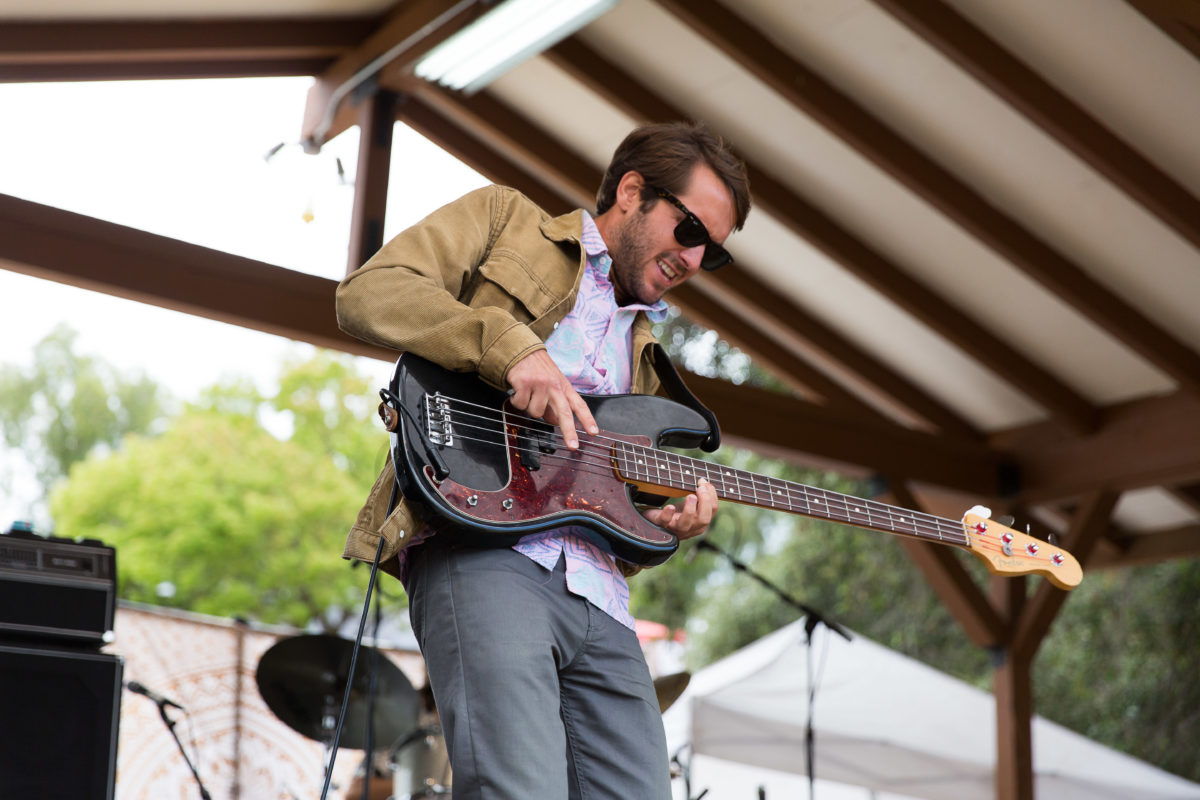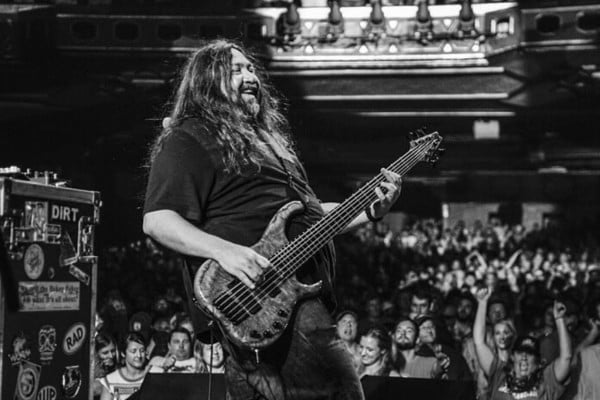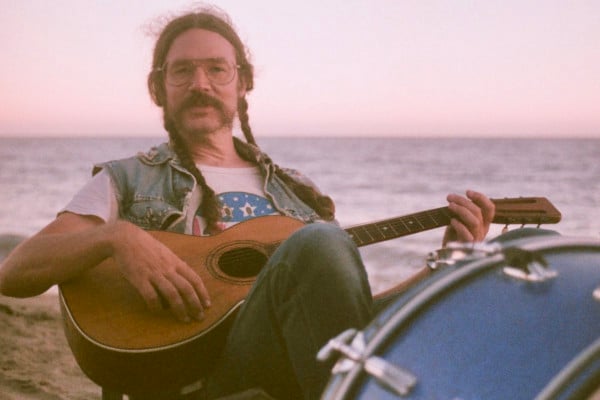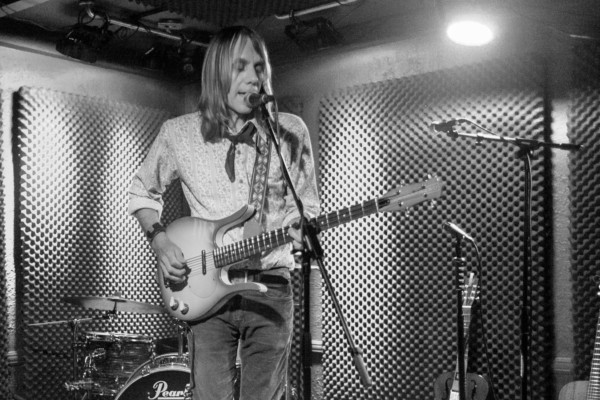Curation, Pt. 3: An Interview with Cameron Wehrle

So far we’ve talked with a label owner and an engineer/producer. But in part three of our examination of Pacific Range’s High Upon the Mountain on Curation Records comes to the central bassist in the whole story: Cameron Wehrle. It’s his solid and tasteful playing that anchors and pushes the grooves throughout the album.
The Americana/jam-band is influenced Gram Parsons, The Grateful Dead, and the Allman Brothers. Through those influences, Wehrle grew to be deeply inspired by the bluesy, R&B, and soul stylings of bass legend Jerry Jemmott. That makes sense after listening to the in-the-pocket bass lines Wehrle dishes out.
We caught up with the Pacific Range bassist to get the scoop on his L.A. music scene, recording High Upon the Mountain, and what it’s like to work with Brent Rademaker, Dan Horne, and Dave Schools.
High Upon the Mountain is available now on CD, vinyl and as a digital download (iTunes and Amazon MP3).
What’s the scene like around you these days?
Definitely blossoming. Echo Park has become its own pulse and heartbeat within the LA music scene, and it’s been a big resurgence in Americana and other [styles]. Obviously, there’s every kind of genre going around LA, which is cool. I like the melting pot music aspect just to absorb a little bit.
I feel like you can just learn from anybody. Even though our music is a little bit more Americana or psychedelic or vintage, I will still take something from a contemporary artist, like James Blake or someone totally different than the Pacific Range sound. I think it’s cool just brushing shoulders with all sorts of artists that are in LA, but as far as the scene that we’ve found ourselves in, it’s been under that Americana umbrella that has definitely been blossoming. It’s just been a cool time to be young in LA again. Obviously, the recent pandemic has changed that for everybody everywhere.
How did you get into bass?
I got my long time bass nerd in me because my dad was a bass player and pretty much put the bass in my hands when I was young. I remember No Treble came out with a really cool article on someone I’m really influenced: Jerry Jemmott. There’s not enough stuff on him and I’m happy that you guys had some cool articles and features and spotlights on him.
To be honest, he’s one of my biggest influences funny enough because I’m such a big Allman Brothers fan that he was Gregg Allman’s bass player for the last decade or so that I was able to go Gregg Allman’s shows. To me, it was watching like a little bit more of a modern James Jamerson just in like full pocket funk. Just absolute powerhouse. Never overplaying, but he can just play.
I know you dig old school playing, but you also enjoy getting out there. Dave Schools was telling me about how he likes to bring a lot of toys to his sessions and that you went straight for the pedals. He was really excited about that.
Yes, for sure. I was nerding out before I even realized I had set up a whole space station around me with a lot of pedals I’ve never even seen before, and I’m a nerd about that. He’s been gifted a lot of things, and he’ll get a prototype of this or that or something that’s not even in production. He brought stuff for everybody – that was so cool about it. It wasn’t just like, “Oh, let’s just have our little bass corner.” He was giving pedals to Stew, our keyboard player, and he had a whole station surrounding Seamus, our guitar player.
Dave really wants to push creativity and never get overly comfortable. The magic lies in when you start bending what your comfort levels are, exploring and going deeper, and that’s what those pedals offer. It goes with his philosophy and his approach, which is cool.
Honestly, we’re also experimental and improvisation-forward. Linking up with Dave really was a fun time because it just seemed like we totally just hit the stride from the get-go.
That was just such a fun session because he helped make it fun that way. Rarely do you feel that creative power in a studio. Sometimes as a bass player, you’re like, “Okay, I’ve got to be as solid as humanly possible and cater to the song,” and Dave made me feel a lot more comfortable than I anticipated. He’s a bass legend, but he really made me feel comfortable out of the gate and he turned out to be an extremely sweet person.
When you’re getting ready to work with all these great bassists, is there a certain level of anxiety from having to be around all that?
A little bit. I have to say, driving up to Oakland to record with Dave Schools, I was a little nervous, not knowing what to expect, how he would be, but thank God he’s an absolute angel. I was hitting the shed more, losing a little sleep, working on trying to just get up there as warmed up as possible, but I realized that as long as you can stay relaxed and open, no matter who, [it will work out]. Sometimes you can overly make yourself nervous and then you realize, “Oh my God, people just want to help.” I definitely was very happy with his personability, but the creativity, everything just came together and he helped propel the session. He was able to get more out of us. He was really cool because you can tell he wants us to kick ass. He’s nice, but you can tell that you’ve got to play, you got to deliver. At the end of the day, he got that out of us in a good way, all of us. His presence alone elevated our playing.
The same thing happened, too, with a little bit under a year prior to that we recorded with Dan Horne. I was a little nervous going into that one, to be honest. These guys are just about as solid people and bass players as you can find on the planet.
How was the session with Dan different? How was Dan a different producer?
Dan’s had a family feel because our circles are more tied because we’re really good friends with the Mapache boys that are also in Grateful Shred with him. It’s definitely a little bit more of the LA family. We’d go into the back garage of his house and it’s very small. I was holding my bass upright a lot of the moments for people to walk around, while the Oakland studio was huge.
That alone, the actual setting was a little more different, but I enjoyed the garage and looking at Dan Horne’s gear. You can tell each piece was hand-selected by him. Everything had its purpose. I just felt like we were in such good hands. I felt super comfortable, and every nervousness went away because he turned out to be probably one of the more mellow people I’ve ever met in my life. It forces you to slow down which is good because I think we all slowed.
We were able to breathe deeper because right outside is the madness of Los Angeles, but you can’t always turn that off. There’s a lot of stress that goes around. Dan really has some Zen energy where it’s just like, “Breathe.” I think that breathing, that breath is almost like you can almost hear that on the record. It’s calming.
Yes. There’s definitely a relaxation about it. I know what you’re getting at because I got that feeling just listening to the album.
I think that can be attributed to Dan and his ears, it’s just awesome. He really curates unique. His personality transcended into that as well. It’s just undeniable. Then the session when we tracked that his steel guitar solo on “Guiding the Mast”. He played steel on that, and that was probably the memory that stood out the absolute most. He’s already basically like a wizard and making the session kick ass, then he sets up pedal steel and just puts such emotion and care into that solo, I think it totally brought that song to life.
It’s just a combination of his engineering skills and being such a laid back producer because he did produce the record, too. He gave us some guidance. He wasn’t opinionated, but he helped guide us if that makes sense. Everything he said had such weight and such good insight to every little thing, like a little drum fill here. He helped produce us, and in that regard, his producing strategy is very- like Buddha. [laughs]
He’s like just an encyclopedia of everything. He’s under the console, soldering some shit, troubleshooting while setting up the best drum sound Nate’s ever had, just casually, just wizardry around the world. You can hear that on like the Mapache records. There’s a Dan Horne sound and it’s real. It’s a thing.
When you came into the session, did you have a pretty solid idea of what you wanted out of your bass tone and your playing?
I think so. As far as my playing, we had become known as one of the busier gigging bands in Los Angeles and playing like three, four, sometimes five nights a week, every week for a long time. By the time we got into the session and had all the dates inked in with him, we had played all those songs so many times and playing out live really helped work out all the kinks. You can feel that we have the improv free flow, but you can also feel like it is grounded and very rooted at the same time. That is attributed to just playing live and just having songs over time.
We try to play them a little different every time, in the vein of Grateful Dead or the Allman Brothers. You want to bring it to life and not play it the same and that’s our live mentality. When we got in with Dan, we were so comfortable that we knew every way to approach the song. We were doing a couple of songs a day at one point, kind of like a very well-oiled machine, but the sound itself, I was open-minded to honestly [when] working with someone like Dan. You could find great examples of his tone if you listen to Cass McCombs’ records, that he also engineers and produces. I recommend listening to his tone on that stuff. It’s really, really good. He’s in another group like the Skiffle Players I believe Neal Casal was in that as well, kind of an LA little jam supergroup, but Dan’s tone is- oh, man. There’s a warmth, there’s just a warmth about him all over. This describes his tone. There’s nothing like it.
He ran me in a really cool analog power amps, all tube. I played his vintage jazz bass. He’s got an old, really beautiful Fender that- man, what was it? An early ’70s or late ’60s J bass. I played that on every song except for one. I ended up using his bass, vintage jazz bass and just trusting his tone. We didn’t do a whole lot of tweaking. It just came out of the gates in this way. I think his approach is very as fairly minimal as well, as far as how he approaches editing us and getting our tones. They’re pretty true. He just puts them all through warm tube amps. One of his secret weapons to his studio – and it takes up about a third of the space of the whole studio – is he has a giant plate reverb. I don’t think my bass had a whole lot of plate reverb, but I think that’s what he had just to- with Seamus’s voice especially, there are some tracks, it just sounds so beautiful.
Dan and Dave are both amazing and they’re just total pillars of the bass community. They were so welcoming to me. I got really humbled by being around them. These guys have put in the work, and it’s inspiring. It really got me inspired to be a better being. Just surround yourself with people that are better than you, that’s how you grow really.
That’s awesome. My working theory is that bassists are just better humans than other people, [chuckles] which makes me feel better to be around them.
I think the low-end frequencies are very healing, and we’re chasing those healing frequencies. I think that totally transcends into the people making those notes. It’s no accident that they, too, embody the sound that they convey, they embody it personally and they mean it. They mean love when they play and that’s what you hear. That’s an ingredient that you just can’t fake: truly meaning your playing and being passionate to that capacity in what you’re doing.
That passion is what makes it, that human experience is what moves you. This human experience is really what it’s all about and it’s best when shared. Sharing that gift of music with- and see it not become disillusioned musicians and still be true to it and true to themselves and the craft and the art, that’s a big thing I took away. I was like, “Yes, you don’t have to lose your soul trying to make it or whatever, just be real.”
We’ve all met plenty of jaded musicians.
Totally. Oh my God, exactly. In LA, it’s no shortage. You have to kind of work on, you have to consciously remind yourself and to stay cool and keep grounded, it’s really important. These are some of the most grounded people I’ve ever met.
I’m a spiritual person. You can feel those nuances just from people and I felt like they helped me grow and built me up in a really encouraging way, but also a way like there is work to do. This is a sacred job. There’s a sacredness to it, to take it seriously, but obviously, you need to have fun. That’s the cool thing too, just laughing, making stupid jokes, just having fun.
Phil and Brent really helped get that session especially. We as Pacific Range knew Dan Horne for a while, but not Dave Schools. Brent really helped get us together with that, so I’ve got to give Brent definitely a good shout-out.
Brent is just a really big people person. For Pacific Range, we just play and not super gung-ho on social media. We’re all really mellow dudes. Brent has been really good because he’s helping just expand our network without us having to overly be all over the internet and stuff. We’d rather play and just have our music do the talking. Brent has really helped get us out more because that’s not exactly our strong suit. That’s been cool. It’s been a great team.
There are so many people that are just completely independent and some people don’t feel they need a label, but it seems to have really benefited you, obviously.
Yes, that’s a great way that I think it rings the most true for us because for so long, we were just grinding. Tiny shows, tiny clubs every single night, and you need to look up from that grindstone to remember to make sure you’re on track. Brent has helped us look up to the horizon and assess what’s in front of us and how to accomplish our goals better. He’s gotten us in touch with people that we get along so well that otherwise would not have had, [like] the Dave Schools session. We opened up for Chris Robinson, I think, because of Brent. He’s in a cool group called the Green Leaf Rustlers and we opened up for them.
He’s been helping us out in that realm because it’s just hard to make those connections, although however well you may be a match for a situation, sometimes you need that link. That’s what Brent has been- just connecting us with the right people and that’s, exactly as you said, helped us grow because you do like to play, so the whole aspect of the networking.
We don’t need to worry about the business side as much, we got that covered. It lets us focus more on what we love: we love playing tunes. We can focus more on that, and we know that Brent’s pushing and spreading the word of Pacific Range. That has just been invaluable. Brent has been an awesome asset for that and kind of a mentor as well at the same time. It’s just been cool, family vibes, and LA. Obviously, we had so much planned and we’re such a live band that I think that this pandemic has been definitely really difficult for us.
It feels better knowing that honestly, once again, having Brent just makes us feel better, he’ll help us get launched and figure this out and stay active during the quarantine. Having him during even a stressful time like this, it helps. When you have people in your corner, it just feels good. Really I feel grateful for that. It almost comes through in the music. I feel like our music really is truly about making people feel better and I think that it’s attracted the family, so to speak, and that message is our philosophy.
I think the people that have all become in our corner, it’s very loving, it just has this family vibe and I feel grateful for that. It’s such a big town, and as daunting as LA may seem, there’s a nice, warm music scene of just good people making good music for music’s sake and not for ego’s sake. That really is a thing that I love about this LA Americana scene. I just can’t help but feel grateful for all of that, Brent with Curation, the LA fam.
Being surrounded by people that have been through things too, it helps ground us and stay on track and Brent’s been through it. He’s been through a lot and he’s been in the scene for a long time, that’s pretty badass. That’s a hard thing to be in it for that long.
He’s survived every scene. He’s like an encyclopedia too, he’s extremely knowledgeable in every random thing possible, every small indie label record you’ve never heard of. He’s so in it, he’s so in it that it’s just cool to see. I feel like between those three guys, it really makes us grateful to be working with people that you have guidance from and look up to, help show you the light, but they also inspire you to be your authentic self too. That’s a cool thing, it’s like a hands-off thing too.
They understand that we’re our own thing and they want us to further realize our identity as a band and they help us with becoming more authentic with that. It’s a trip right now with this pandemic.
It’s a good reminder of the interconnectedness of being- we’re all really connected more so than we realized. I hope this brings us together as mankind. Obviously, it’s a very divisive time politically, but I hope we could all realize the success of everyone, the prosperity of the human race is in all of our best interests. It’s not just everyone for themselves. I hope that through this we can rally around one another, be more caring and there’s a oneness that’s missing. My inner hippie just hopes everyone can maybe come together through this, help each other out more, become more kind because we’re all hurting.
I remain faithful that we can overcome after all this. I know that music will always be the vibrational universal language of the world. Although live music is on hold, I know that music is not going anywhere. The best we can do is continue jamming every day. Music is not going anywhere, so we’ll figure it out. We’ve got to brave the storm together. I think that we’re all in this together. Remembering that makes it a little easier, less daunting.



